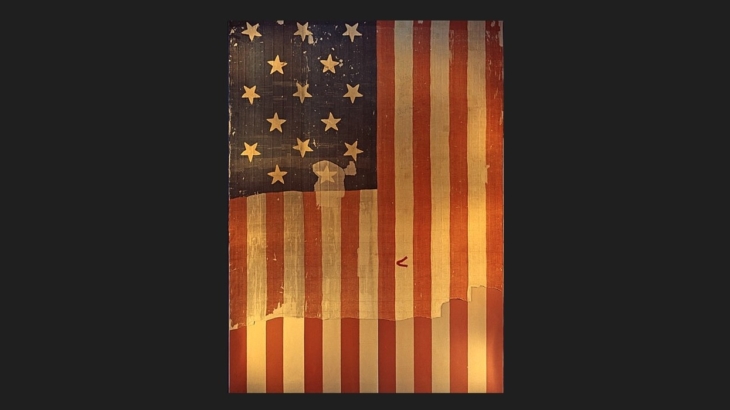Principle of Citizenship and Love of Country

Essay Read By Constituting America Founder, Actress Janine Turner
Citizenship goes well beyond being a citizen. According to the Fourteenth Amendment, “All persons born or naturalized in the United States, and subject to the jurisdiction thereof, are citizens of the United States and of the State wherein they reside.” But it does not require citizens to do anything to maintain it. It confers a right but does not demand a responsibility.
Practicing good citizenship, doing things such as voting, serving your country, following the law of the land, and getting involved in your local community is that unstated, corresponding responsibility. It is that one overarching shared responsibility that gives people common ground and brings them and binds them together and makes cities and towns, rich and poor, men and women, and all races one nation.
So how does a nation inspire its citizens to voluntarily practice good citizenship? How does a nation get its people to do something that takes effort but is not required? What does it take to move citizens beyond “self” and towards the “whole,” beyond “me” and towards “us?”
It is really quite simple; it is love of country. It is human nature for one to treat better and care for more thoughtfully that which they love. It is no different with citizenship. For citizens of the United States, those that love the country best will serve it best. It was certainly the case during our founding era.
Amor patriae is Latin for love of country. It is a noble concept, but what does it mean and how is it manifested? Is it done by flying a flag from your front porch on Independence Day or singing a heartfelt Star Spangled Banner at a ballgame or cheering as America wins yet another gold medal at the Olympics? It is all that but so much more.
Men more eloquent than I have discussed it through the ages. Seneca, the great Roman philosopher, stated “Men love their country, not because it is great, but because it is their own.” Seneca is correct. In many facets of life, we justly love that which is ours, including and even especially, our country. This love of country is not determined by an individual’s wealth but runs deeper than that and transcends material property and wages.
Love of country requires an unselfishness that drives men to reach for a higher place and to love something greater than oneself as Katharine Lee Bates described in America the Beautiful.
O beautiful for heroes proved
In liberating strife,
Who more than self their country loved,
And mercy more than life!
Love of country amongst a people leads to a unity of purpose that is critical to a nation’s success. As George Washington noted in his Farewell Address, “The Unity of Government which constitutes you one people is also now dear to you. It is justly so; for it is a main Pillar in the Edifice of your real independence, the support of your tranquility at home; your peace abroad; of your safety; of your prosperity; of that very Liberty which you so highly prize.” Washington continues that we must be ever on our guard and “watching its preservation with jealous anxiety…and indignantly frowning upon the first dawning of every attempt to alienate any portion of our Country from the rest.”
Love of country is inspirational and creates pride deep within the soul for one’s homeland and those without this feeling are to be pitied. As Walter Scott lamented for such a man in The Lay of the Last Minstrel.
Breathes there the man, with soul so dead,
Who never to himself has said,
This is my own, my native land!
Love of country is a beautiful thing, but it can be a terrible beauty for it compels us forward down a path we may otherwise lack the courage to take as described in the sad Irish ballad The Patriot Game.
For the love of one’s country is a terrible thing.
It banishes fear with the speed of a flame,
And makes us all part of the Patriot Game.
Love of country can fade from the forefront of our minds and the United States, and its countless blessings, can be taken for granted. But sad is the man who would lose his country as Edward Everrett revealed in his short story The Man Without a Country. This poignant tale tells of Philip Nolan, a young American officer turned traitor who wishes to be rid of his country and is granted his wish.
Near the end of his life, Nolan, who has yearned for his wish to be reversed, scolds a young sailor for expressing disgust with the United States: “Remember boy, that behind all these men…behind officer and government, and people even, there is the Country Herself, your Country and that you belong to her as you belong to your own mother. Stand by her boy as you would stand by your mother.”
Love of country was the single greatest influence upon our Founding Fathers as they formed our nation and our Constitution. But their love of country was not something they sought, it developed freely within each Patriot and love of country inspired each in his own way.
Love of country propelled George Rogers Clark down the Ohio to Kaskaskia and then across the frozen wilderness to capture Fort Sackville and Vincennes in 1779, securing the Ohio Valley for America.
Love of country led Daniel Morgan to gather a company of stalwart Virginia riflemen and lead them to Boston soon after the “shot heard round the world” was fired at Lexington and Concord and continue on to his memorable victory at Cowpens.
Love of country caused Nathanael Greene to leave his successful merchant business and Caty and the children and take up arms for a righteous cause and drive Cornwallis from Georgia and the Carolinas.
Love of country influenced John Adams, the Puritan Patriot from Boston, to forego his prosperous law practice and travel to Philadelphia and the First Continental Congress in 1774 to start the march towards nationhood, stating “Sink or swim, live or die, survive or perish, I am with my country…You may depend upon it.”
And it was love of country that inspired George Washington, one of the wealthiest men in the colonies and arguably the man with the most to lose, to risk it all to lead a fledgling army in a war that seemed unwinnable. Later, when the nation he had helped bring forth was struggling under the Articles of Confederation, Washington again came to her aid to lead the Constitutional Convention and guide us as we learned how to govern in a Constitutional republic. The Indispensable Man did all this for love of country.
So why should love of country matter to us today? We must recognize that it birthed our country, it grew our country, and, without it, we could lose our country.
 Tom Hand is creator and publisher of Americana Corner. Tom is a West Point graduate, and serves on the board of trustees for the American Battlefield Trust as well as the National Council for the National Park Foundation.
Tom Hand is creator and publisher of Americana Corner. Tom is a West Point graduate, and serves on the board of trustees for the American Battlefield Trust as well as the National Council for the National Park Foundation.
Click here for First Principles of the American Founding 90-Day Study Schedule.
Click here to receive our Daily 90-Day Study Essay emailed directly to your inbox.




Now, all we hear is how awful our country. How racist, inequitable, how wasteful, etc. This is what’s our children are being taught. How can you love a country you are taught to be ashamed of. We must teach our children why are country deserves areclove, our respect.